|
|
|
Sort Order |
|
|
|
Items / Page
|
|
|
|
|
|
|
| Srl | Item |
| 1 |
ID:
160124


|
|
|
|
|
| Summary/Abstract |
International politics has often been viewed as a brutal place where might trumps right and where, as a consequence, questions of democracy are irrelevant to ask. In the last decades, however, scholars and political leaders have increasingly suggested that elements of democracy exist in governance beyond individual states. If this is so, how does democracy beyond the state shape international politics? This article suggests conceptual preliminaries for theorising consequences of democracy beyond the state in general and their implications for problems of peace and conflict in particular. The purpose is twofold: first, to begin reconstructing existing normative democratic theory into an explanatory perspective sensitive to international politics; second, to indicate how this new perspective is able to explain empirical observations pertaining to conflict and cooperation among states; international institutions; foreign policies; human rights protection; and the violence of transnational terrorist networks.
|
|
|
|
|
|
|
|
|
|
|
|
|
|
|
|
| 2 |
ID:
161270
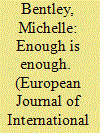

|
|
|
|
|
| Summary/Abstract |
The clash between national security and civil rights comprises one of the most controversial aspects of counter-radicalisation strategy. Analysts present this as a conflict between the need for restrictive security measures (for example, surveillance) and the need to uphold civil liberties (for example, privacy and freedom of speech). In responding to this dilemma, the article examines how this binary normative struggle impacts on the rhetorical presentation of counter-radicalisation policies – in particular, the UK Prevent Strategy and the rhetoric employed by UK Prime Minister and former Home Secretary, Theresa May. It argues that the normative environment has obliged May to construct rhetoric within the context of, what is termed here, normative invalidation. In facing two comparably compelling and related norms of action, May is necessarily required to invalidate or neutralise any norm not adhered to as an essential characteristic of rhetorical strategy. This is discussed in relation to the Strategic Narratives
|
|
|
|
|
|
|
|
|
|
|
|
|
|
|
|
| 3 |
ID:
158281
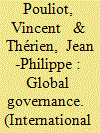

|
|
|
|
|
| Summary/Abstract |
Why is it so complicated to achieve collective action in global governance? This article focuses on one explanatory factor, according to which the global stage is pervaded by normative divisions. Our article helps advance this argument in three ways, by specifying the nature, scope, and mechanics of the global value struggle. First, we show that the distinct visions that clash in the conduct of global governance are formulated in a peculiar idiom of universal values based on contending and polysemous conceptions of the common good. Second, we highlight the ubiquity of universal value claims in global governance debates; regardless of their specific nature or standing, actors of all stripes defend their positions by referring to a certain understanding of the general interest. Third and finally, we specify the mechanics of the global value struggle as actors use the idiom of universal values to communicate and justify their viewpoints publicly. We illustrate our framework by looking into the debates that have structured two prominent cases of global policymaking at the United Nations: the adoption of the Millennium Development Goals and the negotiations over the reform of the Security Council. Overall, the article helps make sense of a counterintuitive dynamic in contemporary world politics: as it attempts to depoliticize global governance, the idiom of universal values actually ends up bringing politics back to the fore.
|
|
|
|
|
|
|
|
|
|
|
|
|
|
|
|
| 4 |
ID:
097731
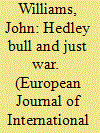

|
|
|
|
|
| Publication |
2010.
|
| Summary/Abstract |
This article explores the reasons for the absence of a systematic engagement with the tradition of Just War in the political theory of Hedley Bull, despite his recognition of war as a key institution of international society and his engagement with normative aspects of International Relations and the thought of Hugo Grotius, a key figure in the Just War tradition. Developing work arguing for Bull's highly problematic reading of Grotius, the article considers the impact of philosophical and methodological aspects of Bull's work to explain his rejection of Just War and to argue that this rejection is neither plausible nor beneficial to Bull's engagement with war as an institution. Additionally, the article considers the potential for and benefits of engagement between English School theory and the Just War tradition for efforts within the English School to more effectively establish its normative dimension.
|
|
|
|
|
|
|
|
|
|
|
|
|
|
|
|
| 5 |
ID:
113738
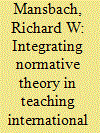

|
|
|
|
|
| Publication |
2012.
|
| Summary/Abstract |
This essay outlines the ways in which the author presents normative theory to his students in his courses and textbook in international relations.
|
|
|
|
|
|
|
|
|
|
|
|
|
|
|
|
| 6 |
ID:
153263
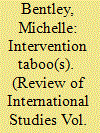

|
|
|
|
|
| Summary/Abstract |
Intervention comprises one of the most contentious issues in International Relations. This controversy results from the way normative understanding is structured around two key, but mutually exclusive, taboos: the moral expectation to respond in cases of humanitarian need and the protection of state sovereignty. In examining this dilemma, this article asks: what happens to the construction of rhetorical strategy, where that strategy seeks to justify intervention (or not), within a binary normative environment? It is argued that actors can only successfully construct a rhetorical case by engaging in, what is termed here, normative invalidation. In a binary situation, actors cannot adhere to both taboos. These taboos are so compelling, however, that actors must necessarily invalidate or neutralise any taboo not adhered to. This is discussed in relation to the Strategic Narratives paradigm and comparative case studies on the presidential rhetoric of Bill Clinton and Barack Obama.
|
|
|
|
|
|
|
|
|
|
|
|
|
|
|
|
| 7 |
ID:
090146


|
|
|
|
|
| Publication |
2009.
|
| Summary/Abstract |
Kenneth Waltz opted to reject the rational actor assumption in developing his theory of international politics. That choice, I argue in this article, creates three problems for his theory. First, it means that it is unsuited for explaining state behavior, which means it is of limited utility for explaining the workings of the international system. Second, Waltz's claim that his theory is well suited to explaining international outcomes - as opposed to state behavior - is unconvincing. Those outcomes are heavily influenced by the actions of the great powers, but if his theory cannot predict their behavior, it is unlikely to reliably predict the outcomes of their behavior. Third, Waltz's assumption that states often behave recklessly leads to a more competitive world than described in his theory. I conclude with the suggestion that the theory's greatest virtue is its normative value - its ability to explain how the world should work, not how it works.
|
|
|
|
|
|
|
|
|
|
|
|
|
|
|
|
| 8 |
ID:
159385
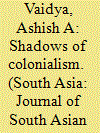

|
|
|
|
|
| Summary/Abstract |
This paper examines the status of tribal communities in central India through the lens of structural violence. In the process, a new and normatively grounded definition of violence is put forward which addresses weaknesses in the original definition proposed by Johan Galtung. The paper connects this new definition of structural violence to developmentalist and capitalist ideology, frameworks that benefit tribal communities by some empirical measures, but which must be recognised as profoundly violent in the normative contexts of those communities. Adivasis are caught between the competing imperatives of the Indian state's different and overlapping stages of modernist development: the remnants of the old colonial ‘civilising’ mission, a post-colonial nationalist industrialism and a post-industrial urge toward conservation. I argue that Galtung's definition is ill-suited to the task of describing this type of post-colonial structural violence, and that my definition solves this problem by accounting for the violence of conflicting normative frameworks.
|
|
|
|
|
|
|
|
|
|
|
|
|
|
|
|
| 9 |
ID:
117053
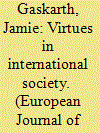

|
|
|
|
|
| Publication |
2012.
|
| Summary/Abstract |
Although there has been a significant growth in the literature on the ethics of international politics in recent years, much of this has focused on the normative structure of international relations and has downplayed the role of individuals in constituting the understandings and actions in this practice. However, individual agency and accountability are apparent in recent world events. Meanwhile, developments in moral philosophy have increasingly led scholars to re-examine the role that individual character traits - virtues - have in affecting how norms are selected and operationalized. Building on these insights, I argue here that a fully realized appreciation of the morality of international politics requires us to consider what character traits - virtues - its individual participants are expected to exhibit to support and realize its norms. To do so, I begin by outlining how the virtues are deemed to underpin ethical practice and highlight two forms of analysis that may be used to explore this: decision-oriented virtue ethics and constitutive virtue ethics. I then suggest that these can be used to analyse the ethical foundations of international society. Specifically, I adopt a constitutive virtue ethics approach to show how the virtues help to constitute international society using the case study of the establishment of the International Criminal Court. In the process, I aim to highlight both the extent to which the virtues are a feature of the rhetoric of global politics, and - more importantly - how they play a significant role in normative practice.
|
|
|
|
|
|
|
|
|
|
|
|
|
|
|
|
|
|
|
|
|